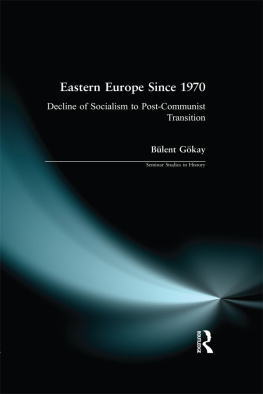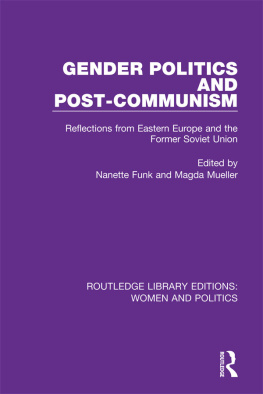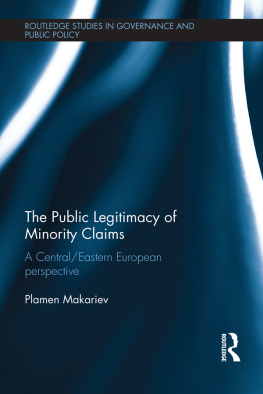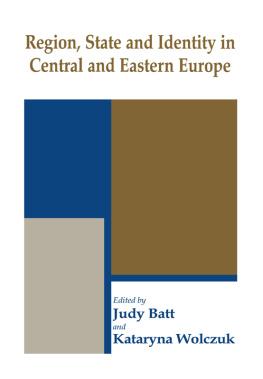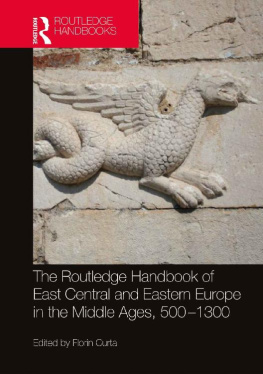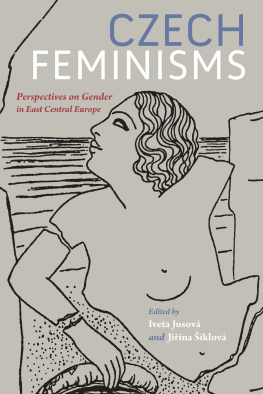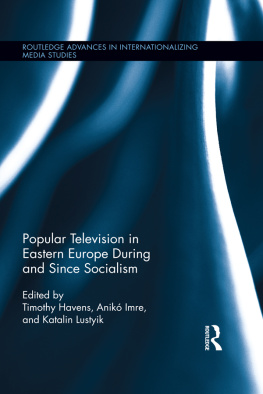Anas Land
First published 1997 by Westview Press
Published 2018 by Routledge
711 Third Avenue, New York, NY 10017, USA
2 Park Square, Milton Park, Abingdon, Oxon OX14 4RN
Routledge is an imprint of the Taylor & Francis Group, an informa business
Copyright 1997 Taylor & Francis
All rights reserved. No part of this book may be reprinted or reproduced or utilised in any form or by any electronic, mechanical, or other means, now known or hereafter invented, including photocopying and recording, or in any information storage or retrieval system, without permission in writing from the publishers.
Notice:
Product or corporate names maybe trademarks or registered trademarks, and are used only for identification and explanation without intent to infringe.
Library of Congress Cataloging-in-Publication Data
Anas Land : sisterhood in Eastern Europe / edited by Tanya Renne.
p. cm.
ISBN 0-8133-2831-4. ISBN 0-8133-2832-2 (pbk.)
1. FeminismEurope, Eastern. 2. Women in politicsEurope, Eastern. 3. Europe, EasternSocial policy. 4. Europe, EasternSocial Conditions1989- I. Renne, Tanya.
HQ1590.7.A78 1996
305.42947dc20
96-33535
CIP
ISBN 13: 978-0-8133-2832-4 (pbk)
Publishers Note
The publisher has gone to great lengths to ensure the quality of this book but points out that some imperfections from the original may be apparent.
To the women in Bosnia and Herzegovina past and present
Preparing this book has been a grassroots endeavor in and of itself. There are many dozens of women to thank for their support, encouragement, and insistence on its completion. First, I wish to sincerely thank each of the women who contributed essays to the book for sharing their lives with me, opening their homes and hearts to me, sharing their frustrations, allowing me the privilege of encouraging them in their fundamentally important work with women, and, not so incidentally, for putting up with changing deadlines and vague requests. A warm and tender thank-you to all the women, contributors and noncontributors alike, for opening their homes and kitchens so readily when I arrived, often with short notice, in their respective cities.
In particular, my deepest thanks and warmest affection go to Lepa Mlad-jenovic, my roommate and mentor in Belgrade and a dynamic, if exhausted, activist, feminist, and lesbian who embraces each and every element of her identity with strength and passion; she is a model for us all. Nela Pamukovic, Martina Belic, Michaela Rosa, Neva Tolle, and the rest of the women of the Center for Women War Victims (Zagreb); Autonomous Womens House, Zagreb; and Zagreb Womens Lobby gave me a home in winter when I most needed one.
Special thanks also go to Suzanna Walters, who laid the egg of the idea in my head over iced coffee on a hot day long ago and far away. To Margi Duncombe, Carol Neel, and Louise LaFond I attribute much of my confidence and ambition to complete this anthology.
I thank Joscelyn Gay and her unquestioned belief in who I am and what the women of Eastern and Central Europe mean to me. And lastly and most deeply, I offer gratitude to Judit Hatfaludi for her encouragement and support in sharing herself and her life with me.
Tanya Renne
Sisterhood in East-Central Europe
Tanya Renne
Movement? What movement? We dont have anything we could call a movement.
Bulgarian feminist
Although the transition to multiparty elections came quickly to all nations in Eastern Europe following the revolutions of 1989 and 1990, in many cases only right-wing conservative and/or religion-affiliated groups had enough structure, history, or influence to put forth a campaign and run for election. Decades of mono-ideology had left the people without a structure to create or deal with choice. Options as a concept had disappeared from social memory, to be replaced by complacency and ambivalence toward anything as dirty as politics. People were unprepared to be citizens, lacking, as they did, political consciousness, awareness, and motivation.
Neoconservatives and the momentum generated by the demise of communism in Eastern and Central Europe brought the people of these countries a reinvigorated sense of purpose, hope, excitement, and national pride, thereby inspiring renewed nationalism. National customs and traditions were embraced with a rediscovered enthusiasm, and religion began to occupy a primary place in many peoples lives. With these new pleasures and responsibilities, most countries harkened back to former free periods, periods before World War II, Nazi occupation, and Soviet liberation. New conservative politicians sought to bring their countries back to true, untainted-by-communism, identities.
For Poland, that meant a state increasingly religious in character and the consequent dismantling of any communist law or policy that contradicted Catholicism. In Slovakia and the Czech Republic, it meant a suspicion toward anything political and a preoccupation with the practical affairs of everyday life. In Romanian society, it meant the rejection of all laws and policy enforced by the brutal Ceausescu regime, not the least of which was the political advancement of women. In Croatia, it meant the renewed embrace of Catholicism and all its trappings, heretofore subdued under Marshal Titos Yugoslavia. For Slovenia, a republic that had undergone reforms since the mid-1980s and in which alternative social movements had been growing, the reaction against socialist policies was the least radical in East-Central Europe but nonetheless threatening to certain social policies, which were renegotiated or sacrificed under a new democratic government.
For feminism, the fall of communism has meant categorical rejection. It is seen either as an imported Western ideology to be rejected out of hand or as an old communist principle to be proudly refused. People of the region are painfully familiar with the use of the women of the Communist Party to spread the propaganda of their governments. Until 1989 the womens movement was under the guidance of the party, and as a result few people can see the difference between that womens movement and the independent strains emerging today. In many places it is assumed that womens groups are the Communist Party in disguise: new name, old policy. Although independent feminism is relatively new to Eastern Europe, it is clearly unwelcome; many in these changing nations see it as a threat.
This rejection of any concept resembling that of socialist policy has sent women back in time. Ironically, it puts them in a similar position to Western women facing abortion restrictions in the wake of the sweeping victory of Christian Democrats across Europe. The issues and destinations are similar, but their origins and means are different.
The experiences of East-Central European women under communism have shaped the present group of feminists and women helping women in the region. As Nanette Funk remarked in her introduction to Gender Politics and Post-Communism, context and concepts must be understood in relation to the experiences of an individual culture. In Eastern Europe today, individual or small-group political activism and influence are unknown. The legacy of communisms consistent and constant oppression is a passive population hesitant to change what has made life difficult, in spite of promises of a rich and prosperous future.



